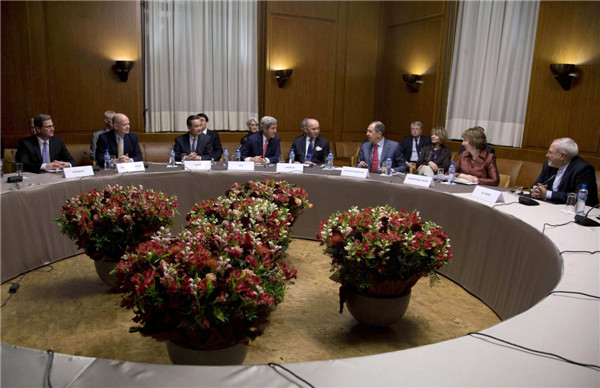 |
|
(L-R) Germany's Foreign Minister Guido Westerwelle, British Foreign Secretary William Hague, Chinese Foreign Minister Wang Yi, US Secretary of State John Kerry, French Foreign Minister Laurent Fabius, Russia's Foreign Minister Sergei Lavrov, EU foreign policy chief Catherine Ashton and Iranian Foreign Minister Mohammad Javad Zarif gather at the United Nations Palais in Geneva Nov 24, 2013. [Photo/Agencies] |
GENEVA - After intensive negotiations, the P5+1 group and Iran have reached a first-step agreement on Iran's nuclear program, EU foreign policy chief Catherine Ashton announced early Sunday morning.
Ashton, who represents the P5+1 group - the five UN Security Council permanent members Britain, China, France, Russia and the United States plus Germany - during the talks with Iran made the announcement at the Palace of Nations, the headquarters of United Nations Office in Geneva.
"We have reached an agreement," Iranian Foreign Minister Mohammad Javad Zarif also announced on his Twitter.
According to the White House, Iran has been committed to halting enrichment above 5 percent and neutralizing its stockpile of near-20 percent uranium by means of dilution or converting.
Furthermore, Iran has been committed not to installing more centrifuges, halting work at its plutonium reactor at Arak, and allowing inspectors from the International Atomic Energy Agency daily access to its enrichment facilities at Natanz and Fordow, the White House said.
The latest round of the Iran nuclear talks, which started on Wednesday and had scheduled to conclude on Friday, entered into the unscheduled fourth day on Saturday, as US Secretary of State John Kerry and foreign ministers of the five other major countries arrived here to push for a breakthrough.
This was the third round of negotiations between Iran and the six countries in more than a month.
Western countries have long been accusing Iran of developing nuclear weapons under the cover of a civilian nuclear program, but Iran insists that its nuclear program is for peaceful purposes.
In response, US President Barack Obama hailed the deal as "an important first step toward a comprehensive solution" to Iran's nuclear program and "the most significant and tangible progress" ever made since he took office.
The president acknowledged Iran's right to peaceful use of nuclear energy as he said "We approach these negotiations with a basic understanding: Iran, like any nation, should be able to access peaceful nuclear energy."
In return for Iran's curbing of its nuclear program, Obama said "We will refrain from imposing new sanctions, and we will allow the Iranian government access to a portion of the revenue that they have been denied through sanctions."
The relief valued at some 7 billion US dollars includes suspending certain sanctions on gold and precious metals, Iran's auto sector and petrochemical exports, licensing safety-related repairs and inspections inside Iran for certain Iranian airlines, and allowing purchase of Iranian oil at its current level, according to the White House.
Acknowledging challenges ahead in talks with Iran, Obama said after the reaching of the deal that the United States and Iran can chip away mistrust.
UN Secretary-General Ban Ki-moon has warmly welcomed the interim agreement, congratulating the negotiators "for the progress made in what could turn out to be the beginnings of a historic agreement for the peoples and nations of the Middle East region and beyond."
The UN chief called on all members of the international community to support this process which, "if allowed to succeed, is likely to be to the long-term benefit of all parties."
Iranian Foreign Ministry spokeswoman Marzieh Afkham said on Sunday "The nature of (Geneva) agreement was a success for Iran's negotiating team."
|
|
|
|
|
|
|
|
